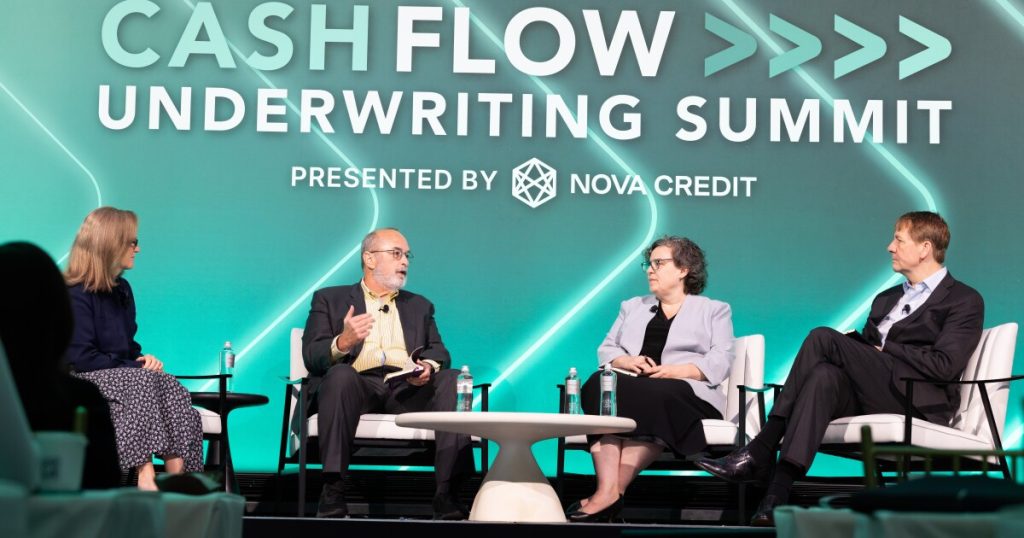When
Some industry participants think banks have a right to charge for the costs of building the technology infrastructure to share data with data aggregators, who send it to their fintech clients, and sometimes bank clients. Others argue that this is simply a cost of doing business, and it’s the consumers’ data, anyway.
The data-sharing rule the Consumer Financial Protection Bureau finalized in October forbade banks from charging for this data. But that rule has been suspended and the Trump-led CFPB is writing a new one that may or may not address this issue. Meanwhile, there’s nothing to stop banks from charging data-sharing fees.
Richard Cordray, the founding director of the Consumer Financial Protection Bureau, said companies should generally not be permitted to charge for their data, “or something very minimal, just to cover the costs, which are minimal,” he said in a panel at Nova Credit’s Cash Flow Underwriting Summit last week.
John McNamara, who was director of the Markets office at the CFPB until two months ago (he’s now chief growth officer at Avtal), also objected to the idea of banks charging for data.
“I’m a markets person, so my default setting is to let the markets sort it out, but I don’t like the idea of the banks charging the fees, or certainly the fees at the level that we’re talking about,” he said at the Nova Credit event. “It probably will eventually become a cost to doing business for banks.”
Phil Goldfeder, CEO of the American Fintech Council, which represents banks and fintechs, expressed concern that a small number of companies are deciding these issues for the country.
“Data doesn’t have to be controlled by any one person or any one entity or any small group of entities,” he said during a panel discussion at an event hosted by
Martin Kliebard, who was a senior fellow at the CFPB in the two years ending this January, made the case for reasonable compensation for industry participants.
When the 1033 rule was written, “if we had had a more concerted effort to incentivize data sharing rather than just expect that it would happen out of thin air, we’d be in a very different place today,” he said at the Solo event. “If we had started out with a value-add framework where all the players in the ecosystem understood that when they added value, they were compensated for that, and when they were receiving value, they were paying for that, it would have become a much more expansionary ecosystem, rather than a zero-sum ecosystem, and we still have a chance to change that now.”
Kliebard noted that banks aren’t always the providers of consumer data; they are sometimes the recipients (for instance, banks that offer personal financial management and aggregate account information from other banks and fintechs to provide a complete picture of a consumer’s finances).
“The reason that I don’t think that the original 1033 rule was as optimized as it could have been, is it wrote all of those rules based on the company vertical,” Kliebard said. “You’re a bank, so therefore you do this; you’re an aggregator, so therefore you do this. In actuality, we all wear different hats.”
If a company is just providing raw data and doesn’t add any value to it, “it should essentially be free or near free,” Kliebard said. “If they have actually added value to it via lineage or via actual work that you put into it in a credit or fraud underwriting piece or anything like that, then you should be compensated for that.”
Former CFPB official Jim McCarthy agreed it could make sense to let data providers charge for it.
“If you look at the tens of billions of dollars invested in bank compliance and risk infrastructure, and the amount of contextualization that goes into data that makes it valuable in the marketplace, I think there’s an argument that they have to be compensated for that trust value, that trust layer,” he said at the Solo town hall. “I’m not saying they should, but I’m saying that Jamie [Dimon] had every right to say what he said. They’re not just going to give their billions of dollars away in the same way the consumer created the data through their actions. They shouldn’t give it away either. And so there’s a happy medium here, and I don’t think we’re there yet.”
Former Massachusetts Congressman Barney Frank, cosponsor of the Dodd-Frank Act, which directed the CFPB to come up with data-sharing rules, pointed out that in 2010 when the bill was passed, there were no data aggregators.
“I don’t understand why we have to have them in the first place,” Frank said at the Solo event. “They add no function. They add no particular value. There’s no reliability. There’s no accountability if they’re wrong.”
Frank argued that consumers should be compensated for the use of their data. “If there are people who are going to make money by accessing something that I believe should belong to you, then they should have to pay you to give it up,” he said. “The people who should pay are the people to whom it has commercial value, and they should share the value they’re going to monetize with the people from whom they’re getting the information.”

